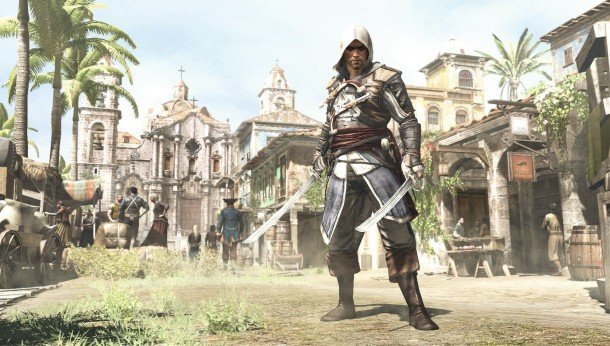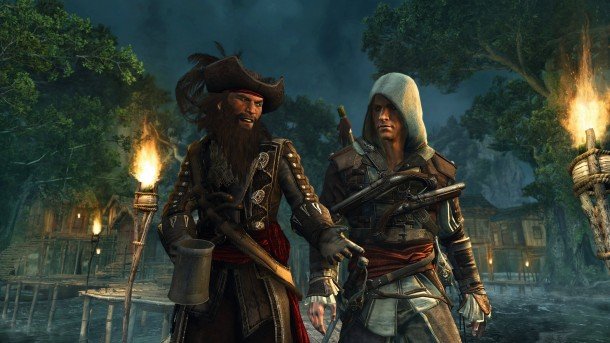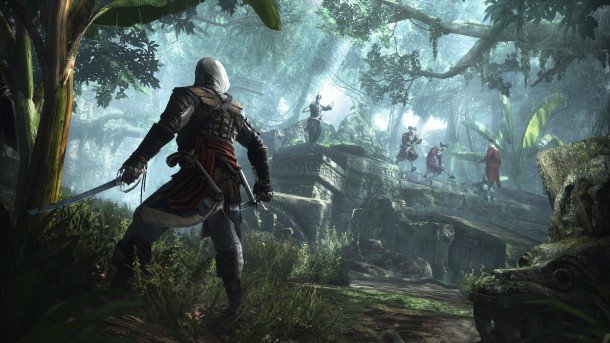
Preview written by Craig Owens.
Assassin's Creed III's best missions involved boats, and I'm not just talking about the naval warfare. As thrilling as it was to heave your hulking frigate in alongside some poor schooner and unleash a spectacular, splintering volley of cannon fire, Connor Kenway's ship was also a useful pretext for leaving the American Revolution behind.
"we're going back in time to the turn of the eighteenth century, a period when the New World really was new"
“Gosh,” I remember thinking the first time some beautiful Caribbean island hoved into view off the Aquila's starboard bow, or the first time Connor disembarked to skulk around some far-flung West Indian fort, “how extravagant to do all this research, and produce all these assets for such a tiny part of the game.”
I was being naive. The glimpses of paradise seen in ACIII and the briny lashings of ship-versus-ship combat accompanying them were merely a tease for Assassin's Creed IV: Black Flag .
Yes, there's a numeral together with that subtitle, suggesting that Black Flag is more its own game than Brotherhood or Revelations were. Or suggesting, if you're feeling cynical, that Ubisoft want to put some clear blue water between Black Flag and the disappointment surrounding ACIII. To be fair, there's also a new lead character to justify that numeral: pirate captain Edward Kenway, Connor's granddad. This means we're going back in time to the turn of the eighteenth century, a period when the New World really was new, and privateers could carve out a lucrative career for themselves on the high seas.

More importantly, we're moving to a place where the naval tech showcased in the third game can take centre stage, and a place where Ubisoft can introduce the changes to Creed's structure it needs if they're going to maintain that yearly release schedule. Traditionally, Assassin's Creed games have centred on urban spaces, linked by sprawling but mostly uninteresting countryside. I liked scampering through the trees and descending upon redcoat patrols like a giant, murderous squirrel in ACIII's frontier, but even that was a place you mostly visited on the way to the more bustling settings of Boston and New York.
"Black Flag doesn't have a single landmass, it has an archipelago"
Black Flag doesn't have a single landmass, however: it has an archipelago, and rather than swinging through foliage or galloping on horseback, this is a place you explore from behind a ship's wheel. The Jackdaw, Edward's vessel, lies at the very heart of Black Flag, and you'll use her to voyage around the 50-something unique locations that make up Ubisoft's Caribbean.
The biggest gaming news, reviews and hardware deals
Keep up to date with the most important stories and the best deals, as picked by the PC Gamer team.
“It'll be the most different Assassin's Creed game in terms of world structure,” says creative director Jean Guesden. “We're not dealing with a few large maps, but with one gigantic hub. You can go wherever you want with your ship and explore these locations.” He goes on to promise a sprawling list of environments: “There's our cities: Havana, Kingston, Nassau. There's fresh settings, like the fisherman's villages; there's plantations obviously, they were a reality of that time. There's hidden coves with treasure, jungles, Mayan ruins, and obviously a lot of tropical islands – we're in the Caribbean.”

Don't expect to sail around the West Indies unaccosted, however, like some pensioner on a cruise. Rival pirates, not to mention the British, French and Spanish navies, will be patrolling the waters. These serve as organic barriers to your exploration of the islands: the plunder you take from defeated foes can be used to upgrade the Jackdaw and enable you to take on tougher opponents. “This big loop... this is how we want players to see the world and progress through it,” says game designer Ashraf Ismail.
"Plunder you take from defeated foes can be used to upgrade the Jackdaw"
Assassin's Creed III's naval battle system managed to convey a surprising amount of weight and drama despite its relatively simple mechanics. Black Flag will add all sorts of rigging to that fine vessel. “Game progression is something we've worked on a lot,” says Ashraf. “Traditionally in Assassin's Creed the enemies were human, and so it's actually very hard to give challenging progression. But because ships are inanimate, we can always have more cannons, more hull for defence, new abilities.”
One enemy type is the charger, a battering ram of a vessel that uses its superior speed and manoeuvrability to line up with Edward's ship and slam its prow into the tender flanks of the Jackdaw. I didn't get to see any other ship types, but Ashraf did explain how players are expected to size up potential enemy encounters: “One of [Edward's] new tools is the spyglass. At a distance, you can look at any ship in the game, you can assess the danger they possess, their strengths, even the cargo they carry, the loot. From a distance you can prepare your strategy for the fight.”
PC Gamer is the global authority on PC games—starting in 1993 with the magazine, and then in 2010 with this website you're currently reading. We have writers across the US, Canada, UK and Australia, who you can read about here.


